Best Practices Policy Bulletins
IISD's Best Practices Series analyzes the evolving scope and nature of investment treaty negotiations, drawing on public treaty texts and model agreements from governments.
These bulletins are based on a review of a vast number of investment treaties and chapters in trade agreements, as well as case law interpreting treaty provisions. The series provides both developing and developed country negotiators with state-of-the-art options and approaches to address the new issues and controversies in investment negotiations. IISD provides these bulletins to help level the playing field in international investment negotiations and ensure access to the latest thinking and approaches.
The series covers a range of different topics related to investment treaties, which can be categorized according to the following three themes:
- Analysis of specific provisions. Topics include the most-favoured-nation clause, performance requirements, and the state–state dispute settlement clause in investment treaties, as well as compensation for expropriation, the definition of an investor, and indirect expropriation.
- Research on crosscutting issues related to several provisions. Topics include compensation under investment treaties, security for costs, exhaustion of local remedies in international investment law, registration and approval requirements in investment treaties, and transparency in the dispute settlement process.
- Reviews of processes or approaches to address such issues, including terminating a bilateral investment treaty.
Bulletins
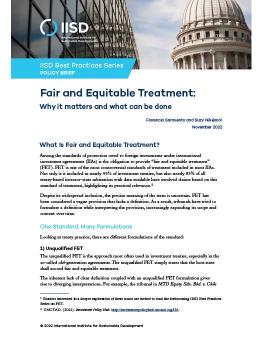
Fair and Equitable Treatment: Why it matters and what can be done
This policy brief presents the different types of FET clauses, the problems associated with its application, and the policy options available to policy-makers to preserve states' right to regulate and avoid ISDS claims.
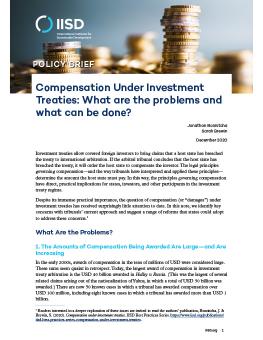
Compensation Under Investment Treaties: What are the problems and what can be done?
In this brief, the authors explore the subject of compensation under investment treaties, as well as options for reform, drawing from their analysis in a related longer paper.
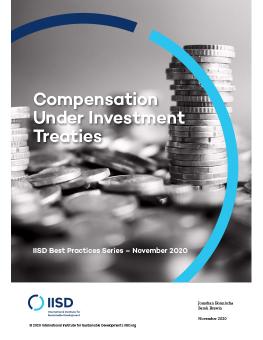
IISD Best Practices Series: Compensation Under Investment Treaties
This paper from IISD's Best Practices series takes a deep dive into the legal principles, arbitral jurisprudence, and lessons learned from how compensation is treated in investor–state arbitration, while presenting possible options for reform.
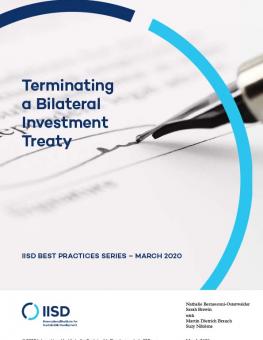
IISD Best Practices Series: Terminating a Bilateral Investment Treaty
This paper examines recent state practice in bilateral investment treaty (BIT) terminations and related drafting, along with presenting options for states interested in addressing their stock of older BITs through termination and renegotiation.
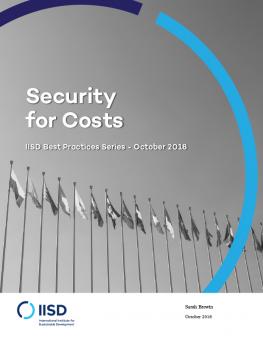
IISD Best Practices Series: Security for Costs
This IISD Best Practices paper explores challenges for states in obtaining orders for security of costs and provides model treaty language designed to help overcome those challenges.
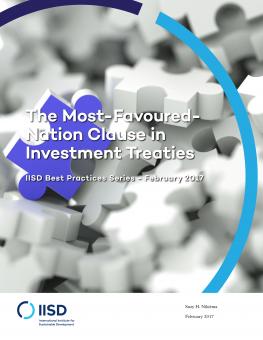
IISD Best Practices Series: The Most-Favoured-Nation Clause in Investment Treaties
This IISD Best Practices paper studies the most-favoured-nation (MFN) clause in investment treaties and its interpretation by arbitral tribunals, drawing lessons for states.
Latest
You might also be interested in
Advisory Services, Technical Support, and Workshops
IISD's international lawyers and policy experts provide training courses, workshops, and a range of advisory services for developing economy officials—covering investment treaties, laws and contracts, negotiations, and dispute prevention and management.
UNCITRAL Working Group III and Reform of Investor–State Dispute Settlement
The UN Commission on International Trade Law Working Group III (UNCITRAL WGIII) has pursued reform of the investor–state dispute settlement model since 2017. IISD is an observer member of the Working Group, using our role to promote a fair system to resolve investment disputes that enhances sustainable development.
The Energy Charter Treaty
The Energy Charter Treaty (ECT) is an energy investment agreement that has grown into an obstacle to impactful climate policies—and a safeguard for the fossil fuel industry. The European Union, Germany, France, and the United Kingdom have all withdrawn from the treaty, which IISD advocated for, and must now neutralize its 'sunset clause'.
Transparency and the UNCITRAL Arbitration Rules
In 2006 the United Nations Commission on International Trade Law (UNCITRAL) began revising its arbitration rules, which are the second-most commonly used in investor–state arbitration. IISD obtained status in 2006 to observe this process, and has actively participated in every session of the Working Group since.








